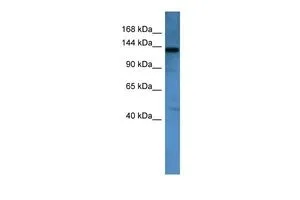
WB analysis of mouse kidney tissue using GTX44608 AFF1 antibody at 0.2-1microg/ml.
AF4 antibody, N-term
GTX44608
Overview
- SupplierGeneTex
- Product NameAF4 antibody, N-term
- Delivery Days Customer9
- Application Supplier NoteWB: 0.2-2.5 ug/ml. *Optimal dilutions/concentrations should be determined by the researcher.Not tested in other applications.
- ApplicationsWestern Blot
- CertificationResearch Use Only
- ClonalityPolyclonal
- Concentration0.5-1 mg/ml
- ConjugateUnconjugated
- Gene ID17355
- Target nameAff1
- Target descriptionAF4/FMR2 family, member 1
- Target synonyms9630032B01Rik; Af; Af4; AF4/FMR2 family member 1; AW319193; homolog of human MLLT2 unidentified; Mllt; Mllt2h; myeloid/lymphoid or mixed-lineage leukemia translocated to 2 homolog; protein AF-4; proto-oncogene AF4; R; Rob; robotic
- HostRabbit
- IsotypeIgG
- Scientific DescriptionThis gene encodes a member of the AF4/ lymphoid nuclear protein related to the Fragile X E syndrome (FRAXE) family of proteins, which have been implicated in human childhood lymphoblastic leukemia, fragile chromosome X intellectual disability, and ataxia. It is the prevalent mixed-lineage leukemia fusion gene associated with spontaneous acute lymphoblastic leukemia. Members of this family have three conserved domains: an N-terminal homology domain, an AF4/ lymphoid nuclear protein domain, and a C-terminal homology domain. Knockout of the mouse gene by homologous recombination severely affects early events in lymphopoiesis, including precursor proliferation or recruitment, but is dispensable for terminal differentiation. In addition, an autosomal dominant missense mutation results in several phenotypes including ataxia and adult-onset Purkinje cell loss in the cerebellum, indicating a role in Purkinje cell maintenance and function. Alternative splicing results in multiple transcript variants. [provided by RefSeq, Jul 2017]
- ReactivityMouse
- Storage Instruction-20°C or -80°C,2°C to 8°C
- UNSPSC12352203
